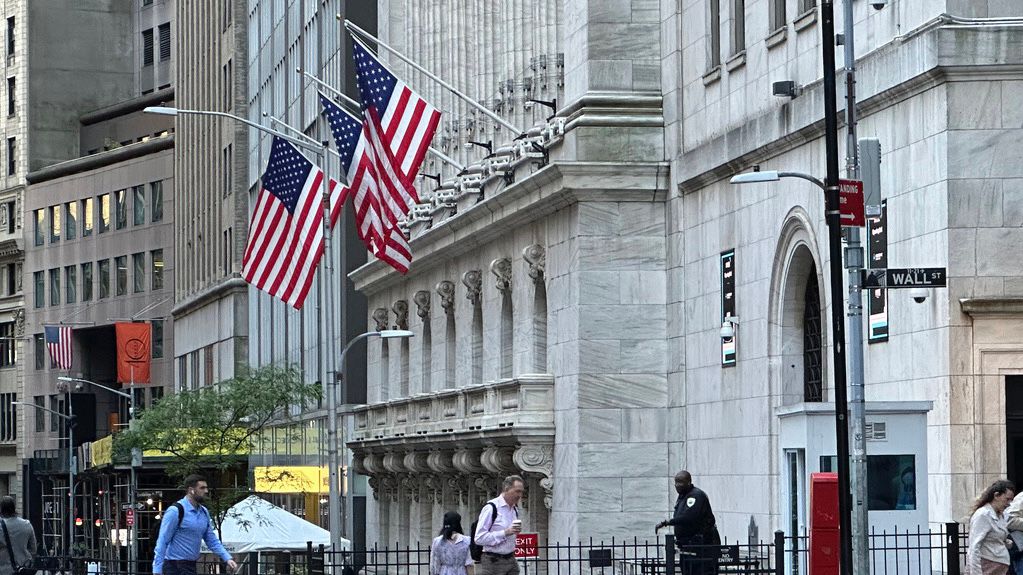U.S. stocks fell on Wednesday, weighed down by rising bond market yields.
The S&P 500 fell 39.09 points, or 0.7%, to 5,266.95, down from a record high reached last week, trimming gains that were on track to be the best May close since November as four of the index's five companies fell.
The Dow Jones Industrial Average fell 411.32 points, or 1.1 percent, to 38,441.54, while the Nasdaq Composite Index fell 99.30 points, or 0.6 percent, to 16,920.58 after hitting a record high.
American Airlines Group Inc. led airline stocks lower after it cut its outlook for spring profit and other financial targets. The company said fuel costs may be slightly lower than previously thought, but key revenue trends could be lower as well. It also said Chief Commercial Officer Vas Raja would leave the company. Shares fell 13.5%.
ConocoPhillips fell 3.1% after it said it would buy Marathon Oil in an all-stock transaction valuing the company at $22.5 billion, including $5.4 billion in net debt. The deal is the latest in a string of recent big acquisition announcements in the industry. Marathon Oil rose 8.4%.
Advance Auto Parts Inc.'s shares fell 11% after its latest quarterly results and revenue fell slightly below analysts' expectations and the company said the industry had gotten off to a slower-than-expected start to the year.
A further rise in longer-term Treasury yields also weighed on the stock market, with the 10-year Treasury yield rising to 4.61% from 4.54% late Tuesday following the auction of $44 billion in seven-year Treasury notes. Fears are growing that weak buyer demand for Treasuries in those auctions could push yields even higher.
The yield on the 10-year Treasury note is still falling this month, but it has been gradually rising since it dipped below 4.40% in mid-May. Rising Treasury yields push down the prices of all kinds of investments.
The swings in yields this month also came as traders recalibrated expectations for when the Federal Reserve will start cutting its key interest rate, which is at its highest in more than two decades.
Wall Street is always eager for interest rate cuts because they boost investment prices and take downward pressure off the economy, but stubbornly high inflation has forced traders to postpone overly optimistic predictions about rate cuts multiple times this year.
The Fed is trying to strike a balance between squeezing the economy with interest rates high enough to completely contain inflation, but not so much that it leads to widespread layoffs.
The Fed said in a report released Wednesday that it has heard from businesses and stakeholders across the country that consumers are opposed to further price increases, which has led to continued increases in insurance premiums and other costs that are squeezing companies' profits.
Despite concerns that cracks are appearing in spending among U.S. consumers, particularly lower-income earners, economists at BNP Paribas expect a healthy job market, slowing inflation and even gains from some cryptocurrency investors to bolster the economy's main engine.
“American consumers have defied the pressures of high interest rates and inflation, as well as fears about economic uncertainty,” said Elena Shulyatyeva, senior U.S. economist at BNP Paribas.
U.S. stocks continue to hit record highs despite concerns about interest rates remaining high, in part because artificial intelligence technology stocks continue to rally. Nvidia's latest eye-popping earnings report helped add to the enthusiasm. The company fell briefly in morning trading but ended Thursday up 0.8%, its most modest gain since the earnings report.
Dick's Sporting Goods Inc. was a winner on Wall Street, sending shares up 15.9% after its most recent quarterly profit and sales beat analysts' expectations. The company also raised its full-year profit forecast.
Chewy, the online pet supplies retailer, also reported better-than-expected profits for its most recent quarter, sending its shares up 27.1%. The company also said it would return up to $500 million to shareholders through share buybacks.
On the international stock market front, Asian and European stock indexes were mostly lower: Hong Kong's Hang Seng Index fell 1.8%, South Korea's KOSPI dropped 1.7% and France's CAC 40 fell 1.5%.
Shanghai stocks were little changed after the International Monetary Fund upgraded its economic outlook for China, predicting the world's second-largest economy will grow at a 5 percent annual rate this year, but the IMF also warned that consumer-friendly reforms were needed to sustain strong, high-quality growth.


